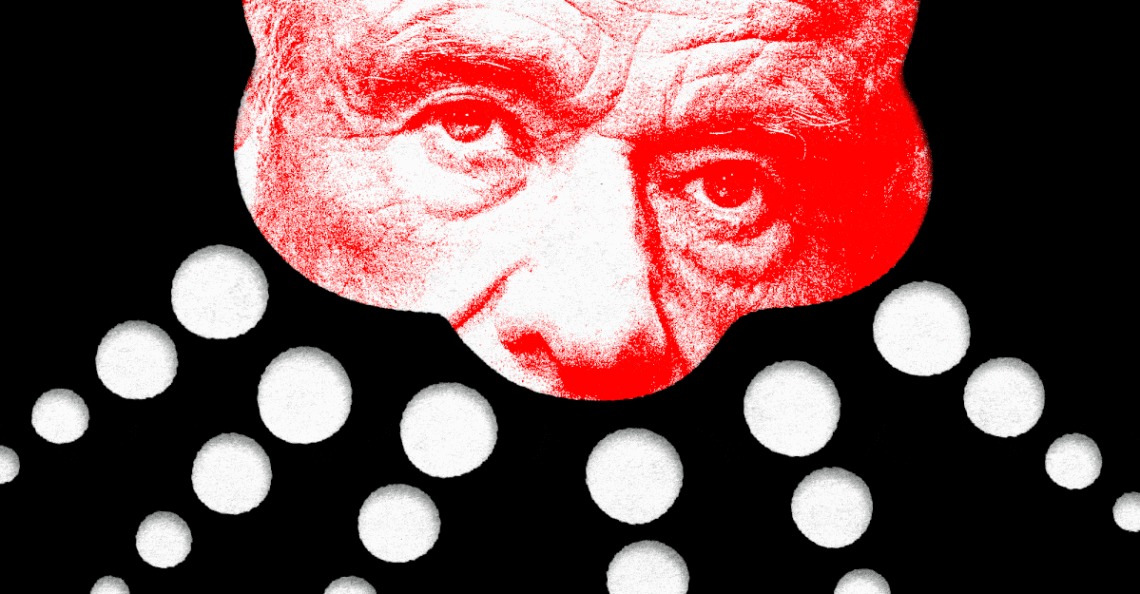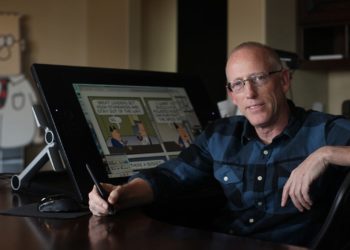The Trump administration is by its own account devoted to stamping out obesity, cancer, and many other chronic diseases in America. But its public-health officials are also attuned to a very different sort of threat: a faulty cast of mind. “Groupthink is the fundamental problem,” said National Institutes of Health Director Jay Bhattacharya in May. The nation’s scientific institutions have become hidebound.
According to Bhattacharya, Health Secretary Robert F. Kennedy Jr., and other top figures in the “Make America Healthy Again” movement, the pandemic brought this problem to the point of crisis. A small group of elite scientists settled upon the use of masks and lockdowns to fight the coronavirus. They closed ranks around their strategies and expelled dissenters. All of this was classic groupthink, the MAHA crowd has argued: a psychological phenomenon that occurs when people’s tendency to go along with the crowd prevents them from considering other courses of action. As a result, in their view, the public-health response to the coronavirus turned into catastrophe. Kids fell behind in school. Drug-overdose numbers exploded. Poor nations starved from supply-chain disruptions.
Now the government is out to quash this plague of poor decision making. In June, when Kennedy sacked all 17 members of the nation’s top vaccine-advisory panel, a Health Department spokesperson said that it was a remedy for “vaccine groupthink.” Upcoming changes to the U.S. dietary guidelines have been cast as a way of fighting groupthink too. Both Bhattacharya and the MAHA leader Calley Means have decried the groupthink infestation in our scientific institutions. And two months before his nomination to be FDA commissioner, Marty Makary published an entire book about the perils of medical groupthink. Health Department Press Secretary Emily Hilliard told me via email that Kennedy is “confronting groupthink by rebuilding a culture where scientists can question, debate, and follow evidence freely so that truth—not conformity—drives public health decisions.” The epidemic of consensus, as he sees it, must be stopped.
Yet, ironically, MAHA’s core concern—that the nation’s most seasoned public-health experts have been rendered senseless over many years by a groupthink dynamic—is itself the product of a shaky sort of group belief. The phenomenon of groupthink has been studied now for decades. More than 1,300 academic papers and dozens of books have been published on the topic. Even after all of this time and effort, the evidence is wanting. In fact, most experts now believe that the old story of groupthink being a prime cause of bad decision making is wrong. Some don’t think that the phenomenon is even real.
“A very curious thing has been taking place in this country—and almost without our knowing it,” the journalist William H. Whyte Jr. warned in a story touted on the cover of the March 1952 issue of Fortune: College kids had gotten meek and group-oriented. Corporations were hiring social scientists to cultivate conformity in their workers. Even literary heroes had been growing more submissive, Whyte claimed. Riffing on George Orwell’s 1949 dystopian nightmare Nineteen Eighty-Four, which popularized words such as doublethink, he dubbed this new American herd mentality groupthink.
The coinage went viral. As his biographer later noted, groupthink was a “broad term that could be used to cast any number of aspersions.” And in mid-century America, there were so many aspersions to be cast! “If you want creativity, abandon the groupthink and concentrate on the lonethink,” begins a news report from an advertising conference in 1959. (“Meetings are for meatheads,” one groupthink-hating executive declared.) One columnist with the New Pittsburgh Courier even slapped Whyte’s label on the United Nations, suggesting that countries, like individuals, had a primal aversion to yielding their sovereignty to the groupthink of world governance.
Whyte’s concept started to appear in management textbooks, too, identified as a concerning philosophy in which people “begin to worship the group.” But the idea really found its place in academia when Irving Janis, a Yale psychologist, borrowed Whyte’s buzzword to label a novel bureaucratic disease that he’d identified. In a 1971 article for Psychology Today titled “Groupthink,” Janis described how the White House had been overcome by a psychological contagion in the lead-up to the Bay of Pigs invasion. Despite their brainpower, President John F. Kennedy’s famously eggheaded advisers had fallen prey to a crowd mentality that had caused them to set aside their misgivings about the attempt to overthrow Fidel Castro’s government so as to preserve, as Janis put it, the cozy and cohesive “we-feeling” of the group. Groupthink explained not just the Bay of Pigs, he claimed, but also the government’s failure to anticipate Pearl Harbor, the Korean War stalemate, and the quagmire in Vietnam.
This rebranding of groupthink, from Whyte’s pop critique of 1950s corporate life to the specific management dysfunction described by Janis, raised its stakes dramatically: Now the epicenter of the problem was in Washington, and an Ivy League scientist was saying that the contagion was to blame for many world-shaking tragedies. In his follow-up book from 1972, Victims of Groupthink, Janis insisted that he was only laying out a “hypothesis,” and he acknowledged that he had no idea what percentage of fiascos were really caused by group pressures that could impel people to set aside their misgivings. But his idea took off just the same.
In the years that followed, whenever a big-time screw-up happened, someone would swoop in and attribute it to groupthink. That included academics, who cited Janis in the context of many of the 20th century’s lousiest decisions, including: Nazi Germany’s invasion of the Soviet Union, Ford’s decision to market the Edsel, Chemie Grünenthal’s distribution of the drug thalidomide, the Carter administration’s approach to rescuing American hostages in Iran, and NASA’s launch of the Challenger space shuttle. Over the course of two generations, then, from the Boomers through Gen Xers, groupthink had come to signify a dark energy that seemed to exert its power at the worst possible times.
Sally Riggs Fuller, an organizational sociologist and a retired University of South Florida professor, remembers hearing about groupthink in a decision-making seminar taught by Ramon Aldag, her graduate-school adviser at the University of Wisconsin at Madison School of Business. He was giving the standard groupthink spiel, starting with the Bay of Pigs and explaining Janis’s model. This was part of the management-studies canon in the late 1980s. “Students loved it,” Aldag told me. But Fuller was skeptical. The groupthink story sounded wrong.
After class, Fuller said, she hustled to Aldag’s office. “I think there’s a lot of other explanations for those bad decisions,” she told him. For a decade before grad school, Fuller had worked various office jobs in the aerospace industry, and she felt that she had a good understanding of how groups made hard decisions. Usually, several factors came to the fore: internal power struggles, organizational self-interest, the legacy of past decisions. It wasn’t just some herd mentality, she insisted. Aldag suggested that she start digging through the scientific literature so that they could evaluate the published evidence.
By the time Fuller and Aldag had done enough research to give a talk at a 1990 professional meeting, the picture wasn’t pretty. The baseline problem, both Fuller and Aldag told me, was that Janis had more or less dreamed up his groupthink model based on his own intuitions and inferences: It was an armchair theory—he hadn’t measured anything. The concept was so sticky and compelling, though, that others started mining histories of notorious debacles for more examples of the same. “It’s a lot of retrospective sensemaking,” Aldag said. (Janis died in 1990, a few years before Fuller and Aldag’s critique of his idea was published in an academic journal.)
A few experimental studies of groupthink had been attempted over the years, but these were plagued with methodological problems. Researchers would construct hypothetical decision-making scenarios for groups of college students, and then measure dozens of variables to test Janis’s model. When a handful of those findings came back as “statistically significant,” researchers concluded that their study provided “partial support” for the theory, Fuller said. “We were aghast at what these academics were doing,” she told me. Contrary to Janis’s theory, the evidence suggested that tight-knit groups—ones with that cohesive “we-feeling”—tend to make better decisions, Aldag said.
“Groupthink is a compelling myth,” Fuller and Aldag argued in their contribution to an academic journal’s special issue for the 25th anniversary of Janis’s theory. “Despite a quarter century virtually devoid of support for the phenomenon, groupthink refuses to die.” Other papers in the journal took more specific aim at the theory. One argued that what Janis took to be a herd mentality might just as well be seen as deliberate, venal compliance. In other words, the misguided bureaucrats weren’t so much “victims” of groupthink as they were savvy operators who were minding which way the political winds were blowing. Another paper, by the Stanford psychologist Roderick Kramer, drew upon newly declassified documents to reanalyze the Bay of Pigs and Vietnam cases from Janis’s book, and found that much of the new evidence did not support the original interpretation. According to Kramer, neither case showed groupthink; they both showed “politicothink.” (Needless to say, Kramer’s coinage has not caught on.)
That special issue marked a turning point for the academic bandwagon that Janis had kicked off. “It would be hard now to get a groupthink paper published in a top journal,” Aldag, who is retired but still sits on editorial boards, told me.
The implosion of Janis’s model has left groupthink in an odd place. In popular discourse, the word has taken on a life of its own, as an insult deployed without clear reference to any theory of psychology. “I don’t think people always know what it means,” Fuller said. Dominic Packer, a Lehigh University psychologist who has written about groupthink, told me that the term has become a useful pejorative. “It’s what the other people think,” he said. “You never hear people say it to their own group.”
Taking potshots at groupthink has become especially popular on the political right, where rugged individualism is beloved and elite consensus makers are not. From 2016 to 2023, Tucker Carlson often signed off from his weeknight Fox News show with a tagline declaring it “the sworn enemy of lying, pomposity, smugness, and groupthink.” Before taking roles in government, both Makary and Bhattacharya joined the chorus in their appearances on Fox News, taking whacks at the groupthink in the U.S. pandemic response.
To be sure, there is something deeply familiar about the idea that human beings will sometimes follow the crowd because they cherish their place in the group. Yet the claim that our public-health mistakes can be pinned on some special force called groupthink is both unhelpful and misguided. For one thing, the label implies that we’d all be better off if a monkish master of “lonethink” could be recruited to weigh the science on their own, and then arrive at the objective answer to a thorny problem, such as whether to shut down schools and when to reopen them. But decisions like these are usually carried out in the face of competing values, squabbling constituencies, and genuine uncertainty about the facts. Deciding what to do requires negotiation and democratic politics. It’s a group activity.
Indeed, the failure of our leaders to explain that public health is never just a matter of “following the science” may be one of the pandemic’s most enduring fiascos. Now the MAHA crusaders themselves seem ready to repeat that error in extravagant ways. “This group is going where the science takes them,” Hilliard, the HHS spokesperson, told me when I asked about Kennedy’s decision to stack the nation’s vaccine-advisory panel with a group of his like-minded associates. To insist that this was necessary to rescue the committee from “vaccine groupthink” is to get the matter backward: It labels a triumph of systematic decision making—one that has saved countless lives—as a tragedy; it courts disaster rather than forestalls it. (Hilliard did not respond to a question about the scientific controversy surrounding groupthink.)
Well-managed groups operating under clear and transparent rules—groups such as the vaccine-advisory committee and the U.S. Preventive Services Task Force (which Kennedy seems ready to also dismantle)—are some of the most powerful and trustworthy decision-making tools that we have. They are guided by published research and hard-won experience on how to avoid bad group decisions. For example, group leaders should not impose their views at the outset, and should make it clear that they value candid input from the team.
But our MAHA leaders don’t appear to be heeding this advice. “A core aspect of the Trump administration is that these leaders are not willing to admit a single mistake ever,” Packer told me. That might drive team members to hide their own mistakes, and to never criticize their bosses, even when leadership is screwing up, he said. Any group decision comes with a degree of acquiescence and a leap of faith. But the best decisions involve bringing groups together, hearing out their different views, and not denying that we have a social nature. Our nation’s thinking isn’t broken, and this administration shouldn’t try to fix it.
The post Everyone Hates Groupthink. Experts Aren’t Sure It Exists. appeared first on The Atlantic.




